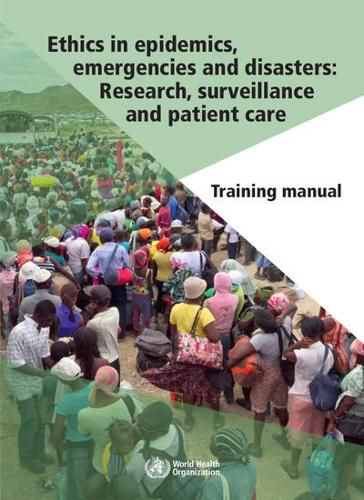Readings Newsletter
Become a Readings Member to make your shopping experience even easier.
Sign in or sign up for free!
You’re not far away from qualifying for FREE standard shipping within Australia
You’ve qualified for FREE standard shipping within Australia
The cart is loading…






In the face of recent pandemic threats (severe acute respiratory syndrome (SARS), avian influenza A H5N1, pandemic influenza A H1N1 and the 2014 Ebola virus disease outbreak) and disasters in general, debate has arisen about the ethical basis of research, surveillance and patient care in such situations. Scholarship on the ethics of public health crises draws on various areas, including clinical practice and research. It is important to keep in mind that emergencies and disasters are the result of interactions between hazards and community elements, including people’s health, with differing vulnerability and capacity to cope with situations. The vulnerability, capacity and overall resilience of countries and their systems, communities and sub-populations define how well they will manage risks and determine the scale of an emergency. Emergencies and disasters can be due to natural (including epidemics, hydro.meteorological and geological) and human.induced (including technological hazards, conflicts, food insecurity and social unrest) hazards or circumstances. The requirements of the community for patient care and for research and surveillance vary case by case and are influenced by how risks are managed before, during and after events and by the type and magnitude of the consequences of emergencies when they occur.
$9.00 standard shipping within Australia
FREE standard shipping within Australia for orders over $100.00
Express & International shipping calculated at checkout
In the face of recent pandemic threats (severe acute respiratory syndrome (SARS), avian influenza A H5N1, pandemic influenza A H1N1 and the 2014 Ebola virus disease outbreak) and disasters in general, debate has arisen about the ethical basis of research, surveillance and patient care in such situations. Scholarship on the ethics of public health crises draws on various areas, including clinical practice and research. It is important to keep in mind that emergencies and disasters are the result of interactions between hazards and community elements, including people’s health, with differing vulnerability and capacity to cope with situations. The vulnerability, capacity and overall resilience of countries and their systems, communities and sub-populations define how well they will manage risks and determine the scale of an emergency. Emergencies and disasters can be due to natural (including epidemics, hydro.meteorological and geological) and human.induced (including technological hazards, conflicts, food insecurity and social unrest) hazards or circumstances. The requirements of the community for patient care and for research and surveillance vary case by case and are influenced by how risks are managed before, during and after events and by the type and magnitude of the consequences of emergencies when they occur.